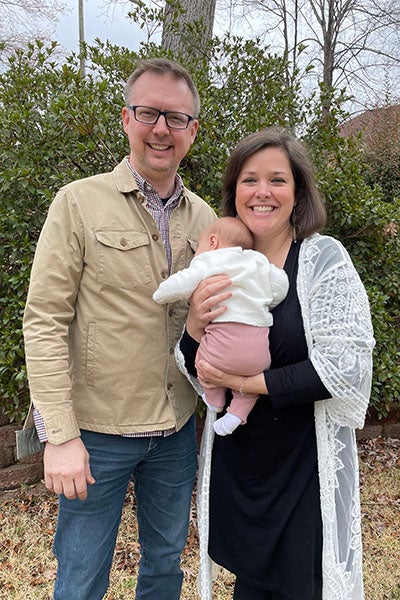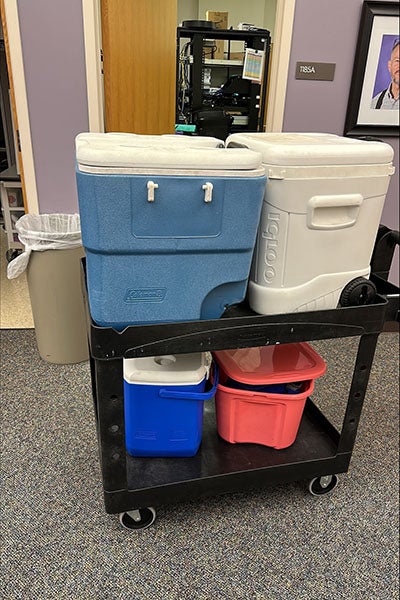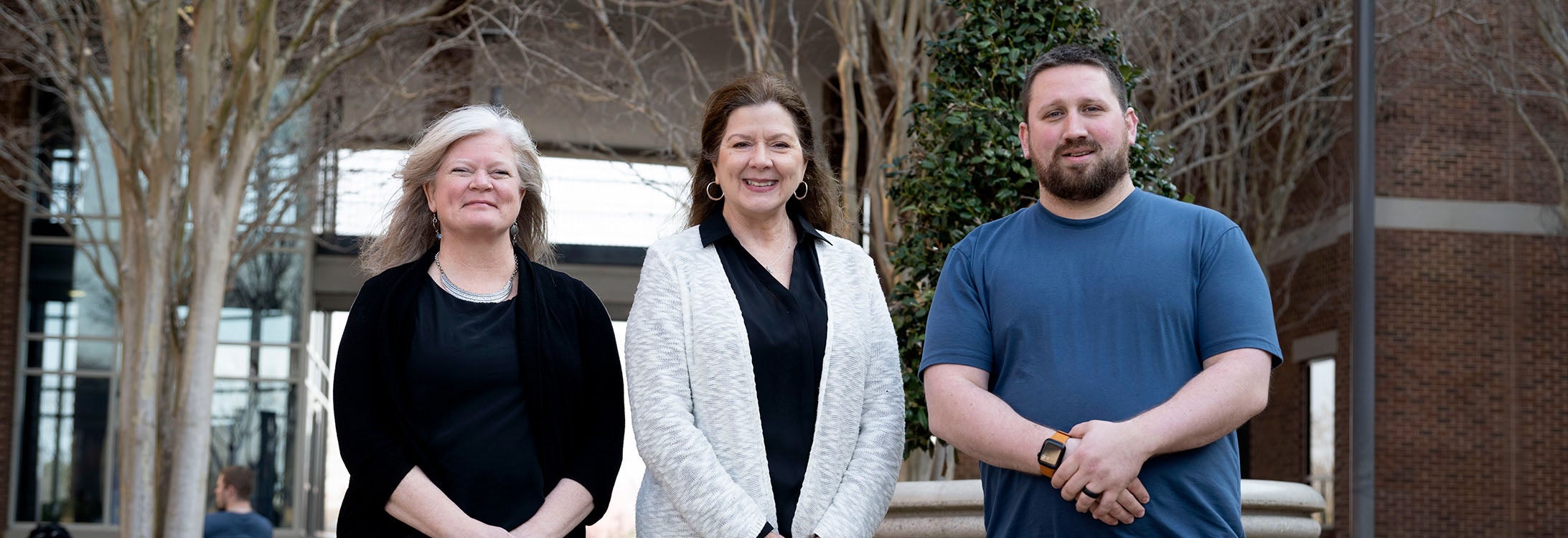DONATION OF LOVE
ECU nursing faculty, staff support care for student's adopted newborn
Sometimes it takes a village. And a caravan. And complete strangers.
Julianne Szymanski has been a labor and delivery nurse for a decade and a half. She has had a front row seat to more babies being born than she can remember and has had the joy of watching new mothers and fathers meet their children for the first time. Two years ago, she began the nurse-midwife program at East Carolina University’s College of Nursing because she had more to give and needed the education to do so.

Julianne and Matthew Szymanksi hold Baby H. Baby H was adopted last semester while Julianne was in nursing school. (Contributed photo)
Julianne and her husband Matthew tried to conceive for several years, but luck wasn’t on their side. They undertook the tedious, and emotionally taxing, process to become adoptive parents and carried along with life — never getting too excited at the possibilities but kept the embers of hope fanned.
On a run-of-the-mill November morning in 2022 Julianne and Matthew received an out-of-the-blue call that they had long hoped would come. Would they be willing to take a little girl who needed a family?
Within two days.
“When we found out we were like ‘Holy cow. Yay. Yes. We’ll take her,’” Szymanski said.
Holding out hope paid off.
The end of the fall semester was close, but Julianne wasn’t completely done with her final papers and assignments. There was no way she’d be able to end the semester while starting a new family at same time, so she emailed her program director, Becky Bagley, to ask for an extension.
Bagley, a clinical associate professor and director of the nurse-midwifery concentration, remembers getting Julianne’s email asking for an extension on the semester because of the seismic shift in Julianne’s family circumstances. Bagley granted the extension without question.
“She’s an awesome student. She didn’t even have to give me that story, I would have given her the extension just because she asked for it,” Bagley said.
As a nurse-midwife, Bagley’s professional life has centered on helping mothers and babies. Any way she can.
A donation
John Smoot works at the College of Nursing in tech support — fixing computers and troubleshooting hardware for faculty and students — so he knows people.
His newborn daughter arrived just before the nation-wide baby formula shortage in 2022 and turned out to be lactose intolerant. His wife, Nicole, pumped and froze her supply of breastmilk in the event that the formula scarcity ended up leaving store shelves completely empty.
As the Smoots’ freezer filled with more than 2,000 ounces of frozen milk, and the formula shortage became less dire as the months wore on, they started to look for a way to donate such a precious resource. On a thriving open market, breastmilk can go for as much as $4 an ounce, but the Smoots didn’t feel right selling the stockpile.
John and Nicole, who are both graduate students at ECU, had long held space for the idea of fostering or adoption. The option of donating to a specific person instead of a milk bank was “a really cool opportunity” they would have preferred. Nicole put so much work into building such a huge store that it would have been a shame to not have the milk go to use in a meaningful, personal way.
John reached out to Bagley one Tuesday evening in late November, just before the end of the semester, thinking she would refer him to a hospital or breastmilk bank in Raleigh. An impersonal bank wasn’t ideal for the Smoots, but it was better than the breastmilk going to waste.
The next morning Bagley sent John the name of someone who could connect him with a breastmilk bank. It wasn’t an hour after sending that email that she received the request for an extension from Julianne. Then it clicked — the new parents could probably use the glut of milk that the Smoots were looking to donate.
“The antibodies are the big thing in the breastmilk that get passed off to the baby. You can make formula that is good, healthy and babies will thrive off of it, but it doesn’t have the antibodies,” Bagley said.
Bagley got on the phone, hoping to catch Julianne during a break in the whirlwind of ecstatic upheaval. She was surprised when Julianne answered right away.
“She called me back the next morning, in tears, and said ‘You’re never going to believe this,’” Julianne said. “Have you ever met our IT guy John Smoot?’ I said yes because we come to campus for orientation. She said John just came to me yesterday and said that his daughter can no longer use his wife’s breastmilk — ‘Can you help us find a home for 2,000 ounces?’”
“So, then I started crying, obviously,” Julianne remembered. “I told Dr. Bagley ‘I don’t know this is going to work.’ We were on our way to the hospital to meet Baby H* and pick her up when Dr. Bagley called me.”
Julianne said that she might be able to text a bit, but her attention was divided; she wouldn’t be able to help with the coordination of the milk delivery. Bagley ran through her list of contacts, hoping to find someone willing to help ferry the milk from Greenville to Raleigh that day.
By midmorning Thursday, John received an urgent message from Bagley.
“I could tell from the excitement in her email that she had somewhere for this to go,” John said. He checked with Nicole to see if she approved of the donation and then started looking for ways to transport a large quantity of very perishable, and incredibly valuable, cargo nearly 90 miles to the Szymanskis in North Raleigh without going bad.
That day.
“I don’t know Julianne, other than the email interactions that we had. I’ve never even seen her face,” John said. “I was adopted, and we didn’t want any compensation, but we have it so why not share?”
You read that right. John was adopted, too. Hollywood couldn’t script this any better.
The delivery
As the possibility of the donation started to take form, John was working on Courtney Caiola’s computer at the College of Nursing, where she is an assistant professor. She lives in Durham and drives past North Raleigh on her way home. When Bagley suggested several faculty members to John and Julianne as possible impromptu couriers, one of names she gave John was Caiola’s.
“She’s here in the building,” John remembered telling Bagley.

Coolers are filled with donated breastmilk that were transported by John Smoot to the Szymanskis. (Contributed photo)
Bagley forwarded a chain of emails to Caiola to explain the background of the situation and enlist her support.
“Immediately, when I saw what was going on, that’s close to my heart in terms of supporting moms so it just worked out really well,” Caiola said. “Part of the process was getting in touch with the adoptive mom. I communicated with her directly and she said, ‘I’m going to the hospital, and I don’t know how long it’s going to take’ but I knew from my experience with adoptions in hospitals they can take a long time.”
Caiola knew that the timing probably wouldn’t work out to meet Szymanski, but the arrangements were made — John would get the breastmilk ready for transport and Caiola would drop it off on her way home.
“I was thinking I could get it all in one cooler, but I ran out of space,” John said. “I ran home and scrambled to find coolers. We loaded up Courtney’s car and she brought it that way.”
The delivery went off without a hitch, other than Julianne needing to find space in multiple freezers in friends’ homes across North Raleigh to store the breastmilk. It turns out 2,000 ounces takes up a lot of space.
A miracle? Good timing? Who can say? But in the end all that matters to Becky and John and Courtney and certainly Julianne is that a baby is being cared for.
Spontaneous community
Unexpected waves of support continue to roll in.
One of Julianne’s previous labor and delivery nurse colleagues brought her an additional 500 ounces of breastmilk. Another nurse friend, who recently had a child of her own, called to say that she had extra milk that she was going to deliver for Baby H, as well.
“It seems like when I count the milk, and have about two or three weeks left, the Lord’s just like ‘Here you go, here’s some more’ which has been amazing,” Julianne said. “I prayed for at least 3 months of milk when we first found out about Baby H, and we have enough to get her through almost exactly 3 months to the day with what is left in our freezer.”
Caiola is glad that a routine Thursday drive home became a lifeline for a new life.
“The fact that John and his wife had the forethought to give the breastmilk away is huge,” Caiola said. “It was gratifying to have a small role. The coincidences, the way it unfolded and the number of people that made it happen felt really special. Even though I didn’t meet the mother and father, I got a very strong sense of how much they appreciated this happening.”
Bagley agrees.
“I had chills for two or three days. Every time I think about it, I get chills having been able to connect them,” Bagley said. “It feels like divine intervention.”
The Szymanskis and the Smoots have yet to meet, but that is likely to happen at the end of the semester when Julianne is on campus for required in-person class work.
“I’m hoping that we can introduce them to Baby H,” Szymanski said.
Julianne had pared back to working per diem shifts to make space for completing the nurse midwifery program, but after Baby H’s arrival the focus has shifted to finishing up clinical rotations and being as present as possible for the baby.
School work and a new family member make the days long and the nights short, but Julianne wouldn’t have it any other way.
“So many people were concerned about us at the beginning. I told them I have waited for this for so long I’m the happiest sleep deprived person you’ll ever find,” Szymanski said.
